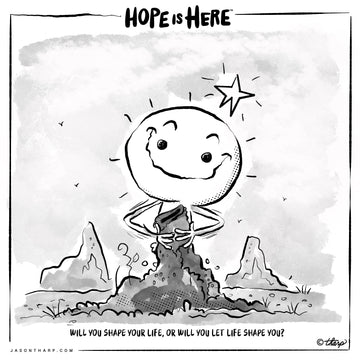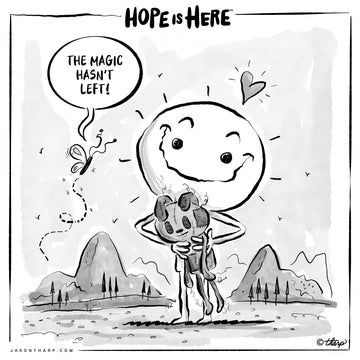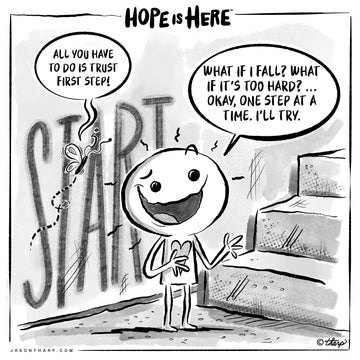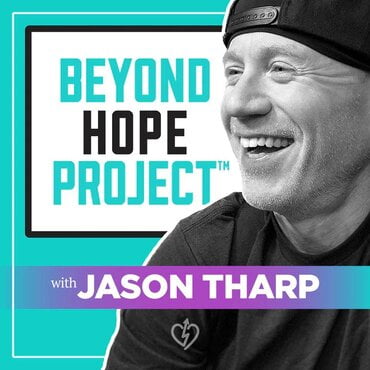I'm writing this from a hospital bed because something wasn't going well, and I had to come in to get checked out. Just to make sure things were going to get back to going well.
This sucks. It's scary. It's unknown.
Just like when I started this journey four years ago, when doctors told me I had seven months to live with Grade 4 Glioblastoma.
We want everything to always go well. But the truth is, it doesn't always go well.
STORY
When you're lying in a hospital bed, everyone has an opinion about what you should be doing, thinking, or feeling. Well-meaning people offer advice based on their fears, not your reality.
You might be the only one who understands what's actually happening. All these well-intentioned people are trying to tell you what they think you need to hear, versus maybe Listening sometimes what it is that you're trying to say.
This leads to frustration and unwanted stress, all while you're just trying to survive.
Don't get me wrong. Their opinions and help aren't unwanted. I love hearing other people's advice and ideas because it helps me educate myself and stop the spin-out stories I tell myself when I get worried.
But here's the thing about being "The Hope Guy" that nobody talks about: I put a lot of pressure on myself because I want to help people who are struggling, maybe newly diagnosed, or working through this terrible disease.
To do that, sometimes I have to walk through some pretty crappy areas myself. It's like clearing a path for somebody else. "Try this way. Don't go that way."
Being vulnerable makes you exposed. But you feel incredibly validated when you get messages from people sharing how some thought you decided to share with the world actually helped them.
This is the paradox of hope work: The deeper you're willing to go into your own darkness, the brighter the light you can offer others.
SHIFT
I'm not a physician offering medical advice. I'm just a regular guy who was given something terrible and refused to accept it. I decided I was going to figure out a way to help myself so I could help other people.
Here's how the H.O.P.E. Algorithm applies when you're staring at uncertainty from a hospital bed:
HYPER-AWARE • Acknowledge that setbacks are part of the path, not detours from it • Recognize the difference between other people's fears and your reality • Notice when you're spinning stories versus dealing with facts • Accept that vulnerability is required for authentic connection
OPEN-HEARTED • Allow yourself to feel scared without letting fear make your decisions • Embrace the support of others while trusting your own knowing • Stay open to lessons hidden inside the difficult moments • Love yourself through the uncertainty, not despite it
PERSISTENT • Keep showing up, even when showing up means lying in a hospital bed • Persist in believing your story isn't over, even when chapters get scary • Continue clearing the path for others, especially when your own path feels unclear • Remember that persistence includes accepting help when you need it
EMPOWERING • Use your experience to validate others going through similar struggles • Share your truth, knowing it gives others permission to share theirs • Transform your setbacks into stepping stones for someone else • Believe that your vulnerability becomes their strength
I've said it before, and I'll say it even more: The importance of thanking your setback.
When I look at setbacks, I can see that the track to where I want to go is not a straight line. And that's okay.
I didn't get this far by only doing what was easiest. I got here by keeping on doing the things I knew I had to do to keep going, to create the world that I want.
And that includes thanking myself, thanking the setback, and thanking even the bad stuff.
Because inside the bad stuff were the lessons I needed to get to the good stuff.
UPLIFT
Hope isn't a passive wish—it's a strategy. And sometimes that strategy includes writing thank-you notes to the very things that scare you most.
Your setbacks aren't punishments. They're not evidence that you're doing something wrong or that you're not strong enough.
They're invitations to find parts of yourself you didn't know existed.
The path to where you want to go isn't a straight line. It includes hospital beds and uncertain moments and well-meaning people who don't quite understand what you're going through.
But it also includes the profound discovery that you can love yourself completely, even in the middle of the mess.
This includes being vulnerable, dealing with shame, dealing with underestimating myself. Because through all of that, I have learned and found a version of myself that I have been looking for forever. A version I can completely love 100%.
And to me, that is a life well lived.
Impossible is optional. But gratitude for the journey, including the detours? That's essential.
What setback in your life is waiting for a thank-you note?
Ready to transform your setbacks into stepping stones? Discover more hope-based strategies at beyondhopeproject.com
P.S. I'm honored to be the keynote speaker at the American Brain Tumor Association's National Conference this September. Visit abta.org/nationalconference to donate to their critical research or register to attend. Let's fund the beautiful mistakes that become breakthroughs together visit abta.org/glioblastoma where your donations will be match by our generous sponsors.
Keep hoping strategically, Jason









